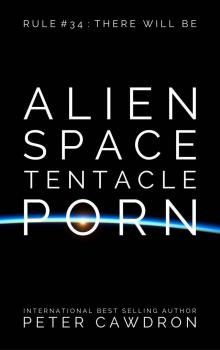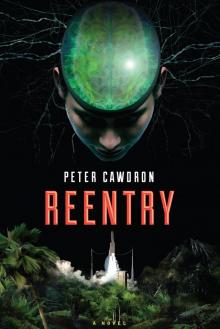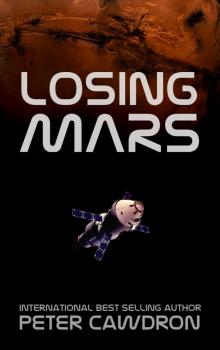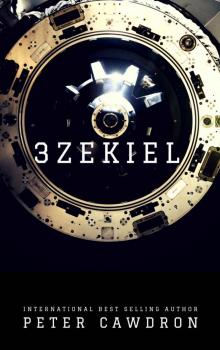- Home
- Peter Cawdron
But The Stars Page 5
But The Stars Read online
Page 5
Several astrophysicists have warned the crew that there’s a danger in reading too much into any apparent similarities with their solar system and have flagged several other nearby star systems as backup targets, but Dante’s excited. Will they find life? The chances aren’t good, but they’re better than not trying.
“It’s worth it,” Dante says, which is not what her mother wants to hear. Too late. With the launch barely eighteen months away, the teams are set. It would take a disaster to prevent her launch or to drag her from the crew—something she feels she can prevent through sheer willpower alone.
A shooting star cuts through the night, arcing across the sky and dying in a blaze of glory. It’s a sight reserved for those venturing out to stargaze—lost to those staring at the TV or drinking in the local bar. It was probably no bigger than a pebble, but it looked magnificent.
Even during Earth Hour, there’s considerable light pollution, but it’s nice to see the stars so clearly from New York, if only briefly. It’s nothing like the view from the Rockies in the depths of winter, but it reinforces the allure that draws Dante into the sky. To her, the stars are the epitome of life. Without them, there wouldn’t be any heavy elements. Once, every cell in her body was caught within the raging furnace of a star, scattered by countless atomic nuclei seething in a plasma superheated to tens of millions of degrees. A couple of billion years later, here she is. For Dante, the flight to WISE 5571 is akin to going home.
“Why you?”
“Why me?” Dante replies. She laughs at the insanity of her life. “Yeah. There are ten billion people on this rock. Ten billion and only ten missions. Less than a hundred astronauts. It’s ‘how come me?” Not, ‘why me?’ Some days, I have to pinch myself to convince myself this is real.”
“But you’ll never have any kids,” her mother says.
“Jules will,” Dante replies. “And Pete.”
“That doesn’t bother you?”
“No. Not in the slightest.”
“You’re young. Too young,” her mother says, but Mom’s interrupted by Dad.
“Jackie. Please.”
“No. It’s got to be said.”
“What?” Dante asks.
“Honey. You’re too young to know what you really want.”
Dante scoffs at the notion. “Mom. I’m twenty-seven.”
“And what about when you’re thirty-seven and stuck around some strange star a billion miles from home?”
“It’ll be more than a billion, Mom,” Dante says, finding her mother’s grasp of distance quaint. “That would only get me as far as Saturn.”
Dante’s tempted to point out that it’ll actually be closer to a quadrillion miles, but that won’t help. When numbers get as large as 10 to the power of 15 they become abstractions layered on top of abstractions. Saying a thousand, million, billion might be just as accurate, but it’s also just as meaningless. Like the untold grains of sand squishing between her toes as she looks out at the stars, it’s a number that has no practical value beyond being way too many.
“You don’t know what you’re going to want,” her mother insists. “What about when you’re forty? Fifty? Sixty?”
Numbers. More abstract, meaningless numbers. They’re not quite as big, but they’re just as intangible to Dante. Right now, she feels as though she’s going to live forever.
“Mom, making one of these missions is literally a one-in-a-billion opportunity. I can’t pass that by. I can’t turn it down. This is the chance of a lifetime—an opportunity to be at the forefront of scientific exploration.”
Dad speaks up, “It’s the Mars loss that has her worried.”
Dante nods, not so much in agreement as in that she understands their concerns. Mars was the dream. For centuries, since at least the early 1600s, people have imagined traveling to and living on Mars. Science fiction made Mars out to be alluring, the adventure of a lifetime. After the US established a colony there and the media began talking of settlers taming the land, it seemed as though the Wild West had been brought back to life. Reality, though, was different. After the first boots kicked up Martian dust in 2037, several additional research stations were established by the Europeans, the Indians and the Chinese. The Russians bypassed Mars, going on to build orbital platforms around Jupiter and Saturn.
The public dreamed of emigrating to Mars. The news media made it out to be the Promised Land. Oh, occasionally reports of deaths rolled in, but fatal accidents happen all the time on Earth. No one blinked.
The loss of the US research station in the Hellas Basin came as a shock. Congress launched an investigation into the deaths of 148 crewmembers when their subsurface habitat collapsed, while the United Nations undertook a broader investigation into the viability of a permanent Martian colony and reported gross mismanagement, escalating costs, a lack of long term sustainability and the inability to achieve material or technological independence from Earth within the next century. Overnight, Mars became the interplanetary equivalent of the slums. The US pulled out. Once American resupply missions stopped, the other nations followed suit. Several automated research hubs replaced boots kicking at the rocks, with an AI controlling daily activity and scientists working remotely from Earth. Instead of propelling humanity to the stars, Mars was seen as a false start, a bitter reminder of just how harsh and costly life is beyond the thin veil of Earth. Public support evaporated. Even the Star Shot program suffered cutbacks. Within a month, thirty-eight interstellar ships became ten, with the threat of being reduced to just one—or worse.
“This is different,” Dante says.
“You say that now,” her mother replies. “Standing here on the shore of an actual ocean, breathing real air, free to go where you want and… I don’t know, pick apples from a tree, buy a candy bar at the store, or go and see a movie with your friends. Once you’re out there, all of that is gone. Forever.”
Dante puts her arm around her mother’s shoulder. She understands. Mom isn’t saying anything out of animosity or selfishness. It’s that she cares. She wants the best for her little girl now she’s all grown up. Every mom goes through that in some way.
“You could stay,” her mom says.
“I could,” Dante replies. “But the stars, Mom—they call to me.”
Benson
“Oh, hey,” Dante says, looking up from her desk in the medical bay. For a moment there, while staring out at the stars, she felt as though she was back on Earth talking with her Mom. Strange. That memory seemed so present—so real.
Benson stands in the doorway with a finger raised, resting it softly against his lips, wanting her to be quiet.
Weird.
Dante’s mind is a blur, a mess, which is unusual for her. Even when she had a few too many drinks back at The Black Hole, their prelaunch bar in Florida, she never felt like this. Oh, there would be the classic thumping headache the next day, but she could normally think pretty clearly. Now, though, thoughts cascade through her consciousness like shooting stars. South Beach. Cap. Benson. A telescope set on the sand. She doesn’t understand why, but she feels as though she was just talking to Benson not more than a few minutes ago—about what escapes her. Her eyes drift to the beds lining the medical bay, settling on one—fourth down from the door, next to the RXA scanner. Benson follows her gaze. He’s looking at the same bed, smiling.
“Is everything okay?” she asks.
“What do you think, doc?” Benson walks softly across the floor, which is strange even for him. He’s wearing socks, something that’s not uncommon on the Acheron, but the way he walks, he doesn’t make any sound. He’s stepping on the balls of his feet, moving like a cat, treading lightly, almost floating above the floor. His eyes are haunting. Perhaps it’s his smile that’s unnerving. It’s a burst of emotion that’s entirely out of place. He knows something. A secret.
“How can I help?” she asks.
Once again, Benson raises his finger to his lips, but his smile is irrepressible, almost delusional. He’s hol
ding a flex. He turns it around, allowing her to see what’s written on the screen.
I don’t think they can read.
“Who?” she asks.
Without saying a word, Benson writes on the tablet with his finger. Why not type or use voice commands or his neural sensor? For that matter, why not simply speak?
The aliens, doc.
She humors him. Is Cap pranking her? Has Vichy put him up to this? Oh, they’re all going to burst in here at any moment, laughing their asses off, making fun of her, calling her gullible.
“Aliens, huh?”
“Shhhh…”
He erases his previous comment and writes a new one.
They haven’t fudged it out yet.
“Fudged?” She smiles. “Did auto-correct get the better of your writing?”
He scrubs his hand back and forth, rewriting just one word. This time, rather than a crazy scrawl, with letters of various sizes running into and over each other, one word is spelled out clearly.
Figured.
“Oh, they haven’t figured it out yet?”
He nods, grinning like a fool.
“They’re not the only ones,” Dante says, trying not to laugh. “Listen, I appreciate a good joke as much as anyone. And, honestly, you’re a delightful interruption to an otherwise boring review of the biome-scan from the sewage holding tanks, but…”
She’s not sure where to take this lopsided discussion and rounds out her thinking with, “I guess cursive writing isn’t high on the alien agenda.”
Benson giggles.
Dante shakes her head, smiling, still waiting for the punch line. The silence that follows leaves her unsettled. When she looks up she sees three words.
Do you remember?
“Remember?”
Benson tucks the tablet under his arm and crouches beside the RXA machine. He pulls out the neural interface, placing the crown of electronic thorns on his head. Without saying anything, he smiles, revealing his pearly white teeth.
Dante gets to her feet.
“You’ve put it on upside down,” she says, reaching up and turning the medical scanner over, resting it above his ears. At first, she’s just playing along, trolling herself as he teases her, but then it hits—the realization. For her, it’s like opening the door on a bitter, cold winter morning and stepping out into the snow. The air is sharp, biting at the skin on her cheeks—such a stark contrast to the warmth of her home—causing an instant reaction. Goosebumps break out on her arms.
There’s no memory as such, no distinct recollection, it’s more of an impression, like the time she ran into her old high school friend Constance outside the Natural History Museum in New York shortly before their launch.
Snowflakes drifted on the breeze. The smiling face that greeted her on that chilly Autumn day was warm. Dante was walking down the vast concrete steps toward fans waiting in the icy slush for an autograph. She never understood why astronauts would have a fan club. She hadn’t starred in any movies or been on some reality TV show. Hell, her social media presence was a bot programmed to post images and clips of her while responding politely to online chat sessions as though it were human. That made for a great party trick—hey, who wants to see me talk to myself? Dante hated that bot.
But there was Constance at the bottom of the steps, about three rows back—one face amid several hundred. Everyone was smiling and waving and calling out her name, but Constance had a glow, for lack of a better term. It was as though she was under a spotlight. It wasn’t until they spoke that a flood of memories came rushing at Dante. In the same way, Benson seems to be inviting her to journey back in time with him.
Dante grabs at the loose threads of a fleeting memory. “Cap was here.”
Benson nods. Damn it, she wants him to say something more, but his smile is gone. His lips have pulled tight, although not in anger. He’s sad.
“You?” she says. “You can see them.”
“Shhh.”
Dante’s heart races. Suddenly, she’s short of breath. Her palms go sweaty. She feels a tingle in her legs.
“I—I don’t understand.”
Benson writes several words. Although they’re upside down relative to her, she can read them, anticipating each of them with just a few letters.
Illusion.
Mirage.
Dream.
Nightmare.
Dante swallows the lump in her throat.
Nothing around her is real.
That thought causes her mind to race—or does it? Are these her thoughts? Who is she? If nothing’s real, what is she? Everything she trusts, every aspect of reality, every sense of being is part of an illusion. The floor, the desk, the row of beds, the medical equipment and lights—is any of this real?
Dante looks at the back of her trembling hands, catching the pores of her skin, the flex of tendons, the fine creases around her knuckles and even the grain of her nails. She turns her hands over, looking at the lines in her palm.
“No, no, no,” she says, shaking her head. “This can’t be.”
“But it is,” Benson says, taking the electronic crown from his head and resting it on the pristine white sheets. He pats the bed softly as if invoking memories. “You remember.”
“I don’t know what I remember.”
“Don’t fight it,” he says, reaching out and taking her hand in his. The slightest touch from him seems to unleash a jolt of energy, causing her to tense up, but she doesn’t pull away.
“We need to remember,” he whispers. “If we don’t, all hope is lost.”
Dante feels her bottom lip quiver.
“I—I don’t know… What the hell happened to us?”
“We need each other. We must help each other,” he says. “We don’t have long.”
“If this isn’t the Acheron, where are we? Really?”
Benson looks lost.
“I don’t know, but none of this is real.”
“How do you know? How can you be so sure?”
“Mistakes,” he replies. “Imperfections. But each time, they get better.”
“What kind of mistakes?” Dante asks, desperate for something to refute the madness, but deep down, she knows he’s right. She can feel it. The darkness. Always so close. Always there, just on the edge of her vision.
“All of this looks real,” he says, gesturing at the window. She can see he’s conflicted, worried about giving up too much. After a few seconds, he acquiesces and says, “The stars.”
“What about the stars?” Dante asks.
“I thought I was going crazy, but the stars…”
Dante goes to the window. She presses her hands on the double-glazed plasti-glass. Her fingers push against the slick surface, grounding her in the illusion, but she’s wary, not wanting to be fooled, wanting to see clearly. The surface feels solid—real. He’s wrong. He has to be. This is stupid.
Outside, the planet is shrouded in darkness, but not for long. A thin, faint blue glow clings to the horizon, curving around the frozen wasteland. Glints of light reflect off lakes that have pooled on a plateau near the equator, kept from freezing by geothermal vents. Dante squints, looking out into space. In the seconds before the host stars emerge, causing her pupils to contract, she sees them—tens of thousands of stars.
“I don’t understand.”
“What do you see?” Benson asks, pointing above the polar region.
“Orion,” she whispers.
“We see what we want to see.”
Her heart drops.
The constellations, so familiar from her childhood, are an illusion. They exist only because of perspective. Like railway tracks that converge in the distance, or cars, trucks, buses and houses that look like toys from a plane, they’re deceptive, an illusion that was destroyed when the Acheron dropped out of near-luminal speed in this distant region of the galaxy.
At eighty-eight light years, the stars out here are the same ones she saw from Earth, but the connect-the-dots shapes are skewed or gone
entirely. No Big Dipper. No Southern Cross. The Pleiades are still there, but only because they’re a star cluster. Virgo is stretched, while Ares is flattened. Apart from the sword, Orion was gone. It was as though he vanished from the sky, dropping his equipment. Now, though, she can see his shoulders and legs. She shouldn’t be able to see him at all.
“No, no, no. This can’t be.”
“But it is.”
“I—I don’t believe it. There has to be some other explanation.” She turns to face him. “This is real. I am real.”
“But the stars,” Benson says. “The stars—they tell us this is a lie.”
Dante panics. She shouldn’t. She was trained to cope with anxiety, to deal with immense amounts of psychological pressure, but nothing could have prepared her for this.
Fear stabs at her heart. It’s overwhelming. She has to escape, to move, to run. Running on a spaceship makes no sense as there’s nowhere to go, and yet she has to get away. It’s a primal response. There’s nothing to fight. For her, there’s only flight.
Her shoes pound on the floor. Behind her, Benson yells, “No. Not the door. Don’t go out the door,” but she has to escape this nightmare.
In response to her approach, the automatic door slides open. All that lies beyond the metal sheet is darkness. In the hazy blur of her mind, she assumes the lights in the corridor are off, but on reaching the threshold she runs into a wall of goo.
Black tar sticks to her, enveloping her, sucking her in as she screams. Dante clutches at the doorframe, fighting against the viscous pull. She reaches for Benson. He’s yelling, but she can’t hear him as she sinks into the mucus. Tentacles emerge from the darkness, claiming her.
Benson grabs her wrist, trying to pull her free, but it’s too late. Nothing can save her. Not even the stars.
Pale Blue Dot
“You’re up, Dante.”
“What?”
Dante blinks under the bright neon lights. For a moment, she struggles to focus on the tech standing in front of her with an electronic clipboard. The woman has a classic white cotton medical smock covering her civilian clothes, but she’s not a doctor. A small green badge glows softly on her lapel, automatically sampling the environment and signaling there aren’t any unknown or dangerous contaminates in the air. Seems a bit over simplistic to Dante. There are definitely contaminants. Outside of a volcanic eruption spewing lava at several thousand degrees, Earth has never known a sterile environment. Even the NASA cleanrooms, where spacecraft and satellites are assembled under rigorously controlled conditions, aren’t actually clean. They’re cleaner, but bacteria thrive everywhere. Clean a surface and you’ve provided a biological niche for warring bacterial species to conquer—and they love a challenge.

 Alien Space Tentacle Porn
Alien Space Tentacle Porn Reentry
Reentry Déjà Vu (First Contact)
Déjà Vu (First Contact) Wherever Seeds May Fall (First Contact)
Wherever Seeds May Fall (First Contact) But The Stars
But The Stars Trixie & Me
Trixie & Me Collision
Collision Jury Duty (First Contact)
Jury Duty (First Contact) Losing Mars
Losing Mars We Are Legion (van Helsing Diaries Book 2)
We Are Legion (van Helsing Diaries Book 2) Van Helsing's Diaries (Books 1-3): Nosferatu
Van Helsing's Diaries (Books 1-3): Nosferatu Shadows
Shadows 3zekiel (First Contact)
3zekiel (First Contact) Vampire (van Helsing Diaries Book 1)
Vampire (van Helsing Diaries Book 1) Xenophobia
Xenophobia All Our Tomorrows
All Our Tomorrows My Sweet Satan
My Sweet Satan Anomaly
Anomaly Monsters
Monsters